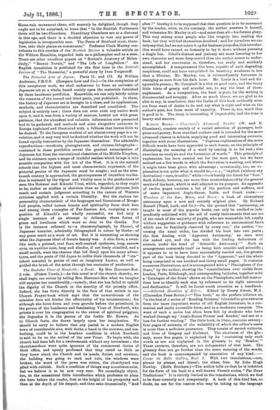The Bachelor Vicar of Newforth : a Novel. By Mrs.
Harcourt-Roe. 2 vols. (Fisher Unwin.)—As this novel is of the church charchy, we shall begin our notice by telling Mrs. Harcourt-Roe what we imagine will surprise her considerably,—namely, that she has failed to uphold the dignity of the Church or the sanctity of the priestly office. Indeed, she has flown directly in the face of that article in our Church Prayer-book which says that the unworthiness of the minister does not hinder the effectuality of his ministrations; for although she bows down and even grovels before the priesthood, in the person of the handsome and fascinating Vicar of Newforth, who priests it over his congregation to the extent of spiritual priggism, she degrades it in the person of the feeble Mr. Rowan. As to Church facts, she draws largely upon her imagination. We should be sorry to believe that any parish in a modern English town of considerable size, with docks, a band in the summer, and sea- bathing, could be in the heathen condition in which Newforth is said to be on the arrival of the new Vicar. To begin with, the church had been left for a twelvemonth without any incumbent ; the churchwardens were quite ignorant of the commonest duties of their office, and openly professed that they cared as little as they knew about the Church and its ;needs, duties, and services; the building was going to rack and rain, the windows were broken, the wood of the pews was rotten, the churchyard was piled with rubbish. Such a condition of things may sometimes exist, but we believe it to be now very rare. We exceedingly object, too, to the sensational little introduction which professes to place the hero before the reader, first at the height of his prosperity and then at the depth of his despair, and then asks dramatically, "And
after ?" leaving it to be supposed that that question is to be answered by the reader, when, on the contrary, the author answers it herself, and reinstates Mr. Manley in all—and more than all—his former glory. This may entrap some people who like tragedy into reading the book, but they will find themselves deceived ; and for ourselves we can only say that, had we not taken it up for business purposes, this introduc- tion would have caused us instantly to lay it down without perusing a single line. Ethel's distrust and jealousy are more lowering to her own character and more deep-seated than the author seems to under- stand, and her conversion is, therefore, too easily and suddenly accomplished. A temperament like hers, capable of such degrading suspicions, could not have vanquished its besetting weakness in less than a lifetime. Mr. Manley, too, is extraordinarily fortunate in emerging BO soon from his dark hoar. Mr. Leslie is a loud and dis- agreeable person ; Mr. Campbell is a blot on good taste, and the many little hints of gossip and scandal are, to say the least of them, unpleasant. As a composition, the book is poor, for the writing is disconnected and scrappy. After so much blame, we are glad to be able to say, in conclusion, that the faults of this book evidently arise not from want of desire to do and say what is right and wise on the author's part, but from want of capacity. There is, too, much that is good in it. The story is interesting, if improbable, and the tone is hearty and sincere.


































 Previous page
Previous page